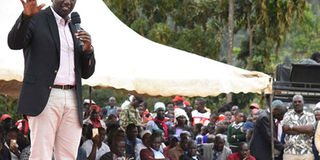Premium
ICC refuses to be drawn into claims of Ruto case revival

Deputy President William Ruto addresses a fundraiser at Kapsigilai in Cherangany, Trans Nzoia County, on January 25, 2020. He claims his opponents want ICC cases against him revived. PHOTO | JARED NYATAYA | NATION MEDIA GROUP
What you need to know:
- The ICC had acknowledged in its annual report submitted to UN's general assembly that investigations were still going on despite termination of the cases.
- The deputy president’s claims of efforts to revive the ICC case against him were either made without notice to his closest confidants or they have been ordered not to talk about it.
The International Criminal Court (ICC) has termed as “speculation” claims by Deputy President William Ruto that there is a plot to revive his 2007/2008 post-election violence case at The Hague.
In an interview with the Nation published on Friday, the deputy president had claimed that a “cabal that went out of its way” to try and stop him and President Uhuru Kenyatta from ascending to power in 2013 was now plotting to block him from the presidency in 2022.
“As of last year, I was having a discussion with the Director-General of NIS (National Intelligence Service), Philip Kameru, and I learned that there are people here who are ready to come and open the ICC cases,” the Deputy President said.
But the Office of the Prosecutor at the ICC in The Hague would not be drawn into the allegations.
“The Office of the Prosecutor cannot comment on speculation,” states the three-paragraph statement in response to a Sunday Nation enquiry.
NO NEW EVIDENCE
In the statement, the Office of the Prosecutor said that though the charges against DP Ruto had been vacated, the door is still open to future prosecution if new evidence comes to light.
But the statement did not say whether there has been any new evidence that would warrant re-examining the case.
“As you are aware, on April 5, 2016, Trial Chamber V (A) vacated the charges against William Samoei Ruto and Joshua arap Sang without prejudice to the prosecution bringing a new case in the future, or in a different form, in light of new evidence,” the statement said.
“As a general matter, in accordance with Article 15 of the Rome Statute — the founding treaty of the ICC — any individual or group from anywhere in the world may send information on alleged crimes to the ICC Prosecutor, who is duty-bound to protect the confidentiality of the information received.
PROBE ONGOING
The Office analyses any such materials submitted, as appropriate, in accordance with the Rome Statute and with full independence and impartiality,” it added.
The ICC in 2018 had acknowledged in its annual report submitted to the United Nations General Assembly that investigations were still going on despite termination of the cases
“The office of the prosecutor continued to receive information on the commission of crimes against humanity during the post-election violence of 2007-2008,” the report said on the ICC activities in 2017/18 in relation to the Kenyan situation.
ALLIES OBLIVIOUS
The deputy president’s claims of efforts to revive the ICC case against him were either made without notice to his closest confidants or they have been ordered not to talk about it.
Senate Majority Leader Kipchumba Murkomen, a close ally of DP Ruto, responded in the negative. “No,” he curtly said to questions about whether he knew of the alleged plot and whether there were any active investigations.
DP Ruto’s office on the other hand said that the deputy president had not discussed that matter with them before he sat down with the Nation journalists for an exclusive interview.
Like the rest of the country, senior staff at the Office of the Deputy President said they only heard about it during the interview.
ICC HURDLES
Meanwhile, human rights activists, including some who have previously worked with The Hague court during the active days of the Kenyan post-election violence cases, said they were not aware of any investigations to revive the cases.
One activist simply responded, “Not that I know of”, when the Sunday Nation asked him about the allegations.
The Office of the Prosecutor in November 2019 published an executive summary of an external expert’s review of the Kenya situation in which several hurdles that led to the Kenyan cases collapsing were identified.
Given that the situation in Kenya has not changed much since the collapse of the cases in 2016, it would be interesting to know how the court would surmount the challenges to conduct fresh investigations in the country and obtain witnesses against DP Ruto, if the claim made was true.
MORENO OVERSIGHT
One of the hurdles that the ICC experienced then, as captured in the review, was that the court was unable “to adequately respond to the challenges presented in cases against powerful, high level accused willing to engage in concerted propaganda campaigns and pervasive witness interference”.
“Certainly, it would appear the Office of the Prosecutor (OTP), under Prosecutor 1 (Luis Moreno Ocampo), underestimated the ability of the powerful suspects/accused in these cases to undermine the integrity of prosecution evidence, and overestimated the ability of the OTP to effectively address the challenges presented by such conduct,” the review noted.
Another problem that the review noted was “pervasive witness interference” and witness credibility that greatly undermined the cases.
“Absent the witness interference campaign, it is very possible the prosecution would have been successful in the case against Ruto,” the review stated.





